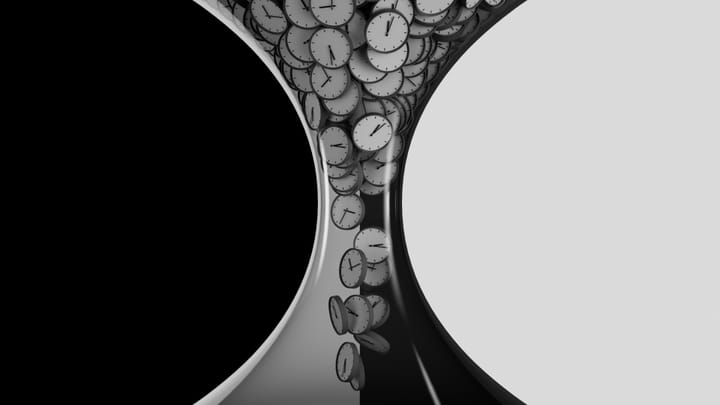How to Juggle Priorities: Decide Which Balls Are Glass and Which Are Plastic
You can't keep all your balls in the air all the time but that's ok! Learn how to decide which to drop and which to keep in the air.

I recently came across a Twitter thread by author Jennifer Barnes about a Q&A session she had seen with author Nora Roberts. Roberts was asked how she juggled writing and raising a family, and Barnes summarized Roberts's response as:
“The key to juggling is to know that some of the balls you have in the air are made of plastic and some are made of glass. And if you drop a plastic ball, it bounces, no harm done. If you drop a glass ball, it shatters, so you have to know which balls are glass and which are plastic and prioritize catching the glass ones.”
I like the metaphor of juggling plastic versus glass balls because it creates a powerful visual of the idea of too many priorities.
Barnes clarified that Roberts was not referring to the elusive discussion of work-life balance where you have work on one side and try to balance family on the other. Barnes related,
“Nora was not talking about juggling five balls. She was talking about juggling FIFTY-FIVE balls. The balls don’t represent “family” or “work.” There are separate balls for everything that goes into each of those categories.”
Be it a deadline on a work project or crazy sock day at school, as Barnes says, Roberts's point was not to
“prioritize kids over work. It was [that] some kid stuff is glass and some is plastic, and sometimes, to catch a glass work ball, you have to drop a plastic family one, and that is okay. And the reverse is also true. Sometimes, to catch a glass kid ball, something at work has to slide, and that is okay, too.”
You can’t keep all the balls in the air all the time
When there are so many balls in the air each day, you have to accept that some are going to drop. You can’t keep all the balls in the air all the time so you have to be intentional about which balls to drop, instead of it just happening.
Instead of focusing on the broad categories of work and family, you need to consider with more nuance which balls are glass, which are plastic, and focus on the glass ones.
But what makes a ball glass?

How to decide which balls are glass and which balls are plastic
It can be tricky to narrow down which balls are glass when it often feels like they are all worthy of your attention. You have to intentionally decide which balls will bounce and which balls will shatter, and drop the plastic ones before the glass ones start to fall.
Relationships and consequences
Though easier said than done, deciding what is a glass ball and what is a plastic ball comes down to 2 things:
1. Relationships: If I drop this ball will it break something in a relationship that matters to me?
You have concentric circles of relationships in your life. There are those that are closest to you that mean the most, perhaps your partner, children, immediate family, and a few friends. Then those who are a bit removed, perhaps good friends, and extended family. And those who are removed further still, perhaps work colleagues and acquaintances, and beyond that strangers.
Everyone’s circles will look a little different but the point is to remember that not all of these relationships are equal. There are some relationships that are glass, and some that are plastic, and the decisions you make need to be made accordingly.
While you obviously never want to cause anyone harm, the impact of some things will be greater for some relationships than others.
For example, deciding to skip your sister’s 40th birthday to go to a work event is likely going to be different than if it was the 40th birthday party of a work colleague. Your sister’s party is likely a glass ball, and your work colleague’s a plastic ball.
2. Consequences: If I drop this ball, can I live with the consequences?
Another factor to consider is consequences. There are always consequences of some kind when you do or don’t do something, but when you are intentional about considering which consequences you can accept, and which you can’t, you can more easily make a decision about what to drop.
It’s a question of whether it will break or bounce. Some additional questions to consider:
- Does dropping this jeopardize my reputation?
- Does dropping this jeopardize my livelihood?
- Will dropping this hurt someone I care about?
- Am I motivated to keep this ball in the air because of fear?
Another angle to consider is whether the consequences are imagined or real. For example, you might worry that someone will not like you or be angry if you say no to a request or ask for an extension on a project. It’s an imagined consequence and one that can be managed by:
- Flipping the script: Would you dislike or be angry at the person you are asking if they asked the same of you?
- ASKING THEM: Instead of building up other people’s responses in your mind, ask them!
You will also likely notice that you usually have fewer glass balls in the air than you think, which gives you the flexibility to drop a few of the plastic ones as necessary.

Decide which balls to drop for now
Just because you decide to let something drop doesn’t necessarily mean you can’t pick it up again later when you don’t have so many balls in the air. Remember that every no can instead be a not now.
You are allowed to change your mind when your circumstances change. That might mean backing out of a commitment you made or declining a new request. BUT you can recommit later or say yes to a new request when you are in a better position to do so.
For example, my husband is on the condo board for our townhouse community. When he went through his cancer treatment, he dropped off of it. As soon as he was well again, he got back on it. He dropped that ball for a time but picked it up again later because it’s important to him.
Decide which balls to drop altogether
Are there any balls you are juggling out of habit or obligation? These are the commitments or priorities that you no longer enjoy, you have grown out of, or are not relevant during this season of your life. You need to drop them altogether to make space for yourself.
Balls you might drop altogether could include:
- Volunteer commitments you no longer find fulfilling.
- People you have outgrown that you no longer enjoy spending time with.
- Hobbies that you don’t enjoy as much as you used to.
- Habits that you do every day, but could be changed for the better or stopped.
As you decide which balls are plastic and which are glass, it comes down to an honest, intentional evaluation of what matters. There are things that matter and things that don’t. The plastic balls are the things that don’t. They are the “nice to haves/do” but if you don’t, no big deal. Sure someone might be disappointed or annoyed, but you can’t please everyone all the time. You also might pick them up at a later time, or you might not, and that’s ok.
As you juggle the many balls you have in the air on any given day, do what you can to focus on the glass ones!
Need help figuring out how to decide which balls are glass and which are plastic. I can help. Book a free consultation.
Share
Ashley Janssen

Productivity consultant, writer, speaker, serial entrepreneur, chaos calmer, introvert, cat-lady. Lover of books, fitness, old fashioned’s, basketball, and video games.
Follow me on
Twitter
or
LinkedIn.
Hire me for
1 on 1 productivity consulting
or
speaking.
Related articles

Debunking The False Promises of Productivity

How to Stay Productive When Things Calm Down


Comments ()